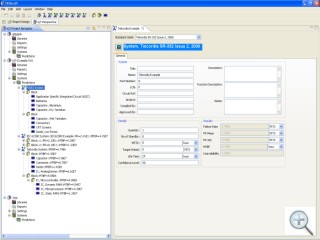IEC 62380 Electronic Reliability Prediction
The latest release from ITEM Software is an extraordinary collection of new capabilities that provides a customizable, cross-platform, multi-user, open frame-work. Built on proven and recognized analysis engines, ITEM QT (iQT) is a revolutionary approach to reliability, safety, and risk analysis software tools. With iQT, you are no longer limited by the technology choices of software vendors or chained to infrastructure requirements of their products.
The IEC 62380 module of iQT supports reliability prediction methods based on the latest European Reliability Prediction Standard. Originally, a French Standard published by the Union Technique de L'Electricite (UTE, July 2000 - RDF). The standard has evolved and become the European Standard for Reliability Prediction (IEC 62380). Its unique approach and methodology has gained worldwide recognition. IEC 62380 is a significant step forward in reliability prediction when compared to older reliability standards.
The IEC 62380 module provides models for reliability prediction of electronic components, optical cards, printed circuit boards and equipments, which takes directly into account the influence of the environment. Environment factors are no longer used as they are replaced by mission profile/ thermal cycling undergone by the equipment. These models can handle permanent working, on/off cycles and dormant applications. Failures related to component soldering are included in the component failure rate.
This technical report provides elements to calculate failure rate of mounted electronic components. It makes equipment reliability optimization studies easier to carry out, thanks to the introduction of influence factors.
Focused on reliability, safety, and risk assessment, our iQT product is a highly extensible framework that provides common infrastructure for any kind of system modeling.
The capable nature of iQT is achieved by an existing Java platform foundation that is widely supported in your business environment. By following the predefined interface, your team has the ability to create plug-ins that extend the capabilities of iQT . The following are examples of possible iQT extensions:
- New editors or viewers for a given model (file) type
- New quantification model types
- New result types
- New analysis engines
The well-established core services of this platform provide the essential functionality to model and analyze reliability, risk and safety projects. Regardless of the configuration of a particular installation, the core services are available in the framework.
All extensions are highly modular. By allowing capabilities to be added to or removed from the software without affecting other extensions, new functionality, perhaps a new prediction standard, can be added without requiring reconfiguration or redesign of the source code.
iQT is a fully functional open environment, supporting the addition of third-party plug-ins such as:
- Version management plug-ins
- Project management plug-ins
- Third-party computational environment tools (e.g. MATLAB)
- Third-party modeling tools (e.g. data analysis)
- Documentation tools (e.g. PDF viewers)
- Search tools
- Customizable, cross-platform, multi-user, open-framework
- Built on proven and recognized analysis engines
- Supports the same modules as our flagship product ITEM ToolKit
- Update manager allows the user to upgrade to the latest version online
- Refrains from loading and creating models until needed, dramatically reducing memory usage and startup times
- Easily create or modify existing prediction approach with a prediction module editor
- True cross-platform capabilities through Java-based framework and analysis engines
- Library function allows automated update of models
- Easily revert to any previous version of a model
- Restrict access to particular models to one user or group
- Create different branches and variations of the same model for 'what if' investigations
- Merge project work from multiple teams into a single project
- Designed by engineers for engineers
- Fully functional open environment supporting addition of third party plug-ins
- Stores external documentation like MS Word, PDF or CAD drawing files
- Configurable to interface with other programs
- Powerful, proven and configurable quantification engines
- Open standard allows users to make changes to the model outside of iQT
|

> Electronic Reliability Prediction Software
> Based on IEC 62380 Standard
> Customizable, Multi-User, Open-Framework
> True Cross-Platform Capabilities
> Modular Design Allows Choice of Analyses
> Supports Third-Party Plug-Ins
> Extensive Reporting and Charting Facilities
> Stores External Documentation
> Configurable Quantification Engines
|